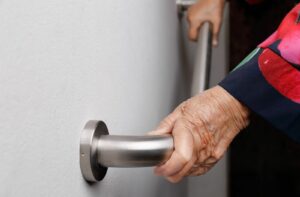Whether due to age-related conditions, injury, or illness, the inability to walk independently can significantly impact a senior’s quality of life.
As a caregiver or family member, there are numerous ways you can provide both practical assistance and emotional support to help your senior parent, including:
- Encouraging open communication
- Seeking professional guidance
- Providing physical assistance when needed, including mobility aids
- Creating a supportive environment
- Encouraging independence
- Encouraging social connections
- Practicing self-care
Peregrine Senior Living is here to help your loved ones with this new chapter with dignity and comfort; we offer assisted living services with 24/7 care from our trained team members, transportation and mobility aid, and apartments equipped with safety in mind.
Open Communication
Open communication with a parent about their mobility limitations is an essential step in providing support and understanding.
Begin by encouraging them to openly discuss their feelings regarding their mobility changes, using gentle questions to show your concern, and create a safe, non-judgmental space for them to express any emotions, including frustration, sadness, or fear.
Listen Actively & Validate Their Emotions
Practice active listening by giving full attention, making eye contact, and validating their feelings without rushing to offer solutions, reassuring them that their emotions are understandable and valid.
It is important to also show empathy by acknowledging the challenges they face and offering emotional support, emphasizing your commitment to their happiness and well-being.
Seek Professional Guidance
Seeking professional guidance is not only okay, but it is often an important step toward achieving personal and professional growth, solving complex problems, and making informed decisions.
Consulting with healthcare professionals, including doctors, physical therapists, and occupational therapists, to assess your parent’s specific needs and get professional advice can help make managing mobility limitations more approachable.
It may be necessary and worthwhile to explore mobility aids such as walkers, canes, wheelchairs, or mobility scooters to enhance your parent’s mobility.
Home Modifications
You may also want to consider home modifications or assistive devices that can improve accessibility and safety within the home, making daily activities easier and reducing the risk of falls or injuries. Another option is to check out Peregrine Senior Living–our assisted living apartments are modified with mobility in mind!
Provide Physical Assistance
Offering physical support to your parent with daily tasks such as standing, walking, or transferring between surfaces can greatly improve their mobility and independence. It’s also important to learn and practice safe lifting techniques to avoid injuries for both you and your parent.
Additionally, enrolling in caregiver training programs can be beneficial. These programs equip caregivers with the necessary knowledge and skills to effectively and safely assist individuals with limited mobility.
Create a Supportive Environment
Creating a safe, accessible home is vital for a parent with mobility issues, helping to promote independence and prevent accidents.
- Remove obstacles and hazards such as cords and small furniture.
- Secure rugs and carpet corners using non-slip pads or tape.
- Enhance lighting in key areas like hallways and staircases to aid visibility.
- Install grab bars in the bathroom by the toilet and bathing area.
- Ensure there are sturdy handrails on both sides of all staircases.
- Adjust each room’s layout to create ease of access and ensure all essentials are within easy reach.
Encourage Independence
Encouraging your parent to engage in activities within their capability range is an aspect of supporting their independence and promoting a sense of purpose. Activities can range from personal care routines to various hobbies that align with their interests and physical abilities. Activities can also include manageable chores like laundry or organizing, making sure that safety and manageability are kept in mind.
Autonomy & Respecting Choices
- Include your parent in care and life decisions, offering choices to reinforce autonomy.
- Respect their preferences in daily routines and social activities, affirming their self-determination.
- Make sure that their input is considered in their care plan, aligning with their wishes and emphasizing a person-centered care approach.
Social Connections
Addressing loneliness in older adults is important for their overall well-being, requiring a multifaceted approach to enhance their social interactions and maintain connections when they can’t walk.
- Introduce your parent to technology, providing them with tools for staying connected through social media, video calls, and messaging apps to bridge the gap created by physical distance.
- Encourage active participation in community activities, such as classes or volunteer opportunities, allowing them to engage with peers and contribute meaningfully.
- Ensure accessibility to transportation options and verify venue accessibility to eliminate participation barriers.
Implementing these strategies can significantly enhance the social well-being of older adults, making sure that they lead fulfilling and connected lives despite the challenges posed by aging.
Practice Self-Care
Focusing on your physical and emotional health as a fundamental strategy to prevent burnout helps to make sure that you can continue to offer quality care. Some options to consider are sharing duties and tasks with other family members or seeking assistance from professional caregivers, such as the trained professionals at Peregrine Senior Living.
Make sure to also regularly schedule time for relaxation and fun for yourself so that you can recharge your battery.

Thriving Through Mobility Challenges
Supporting a parent who can’t walk requires a combination of practical assistance, emotional support, and compassionate understanding.
By fostering open communication, seeking professional guidance, providing physical assistance, creating a supportive environment, encouraging independence, fostering social connections, and practicing self-care, you can help your parent navigate with dignity, comfort, and a sense of empowerment.
Remember, you are not alone in this journey—Peregrine Senior Living is dedicated to supporting your loved ones with our assisted living services, mobility assistance, and apartments designed with safety as a priority. Reach out today and tour our community to see how we can help support your parent.









No more posts